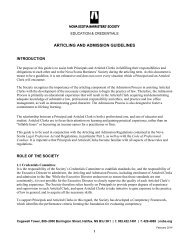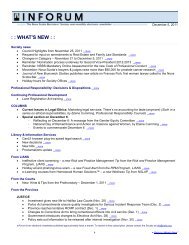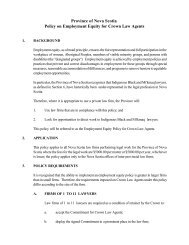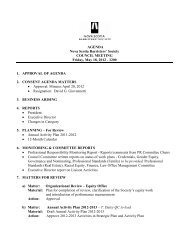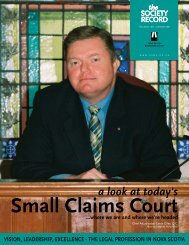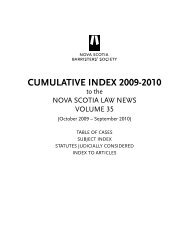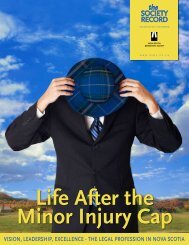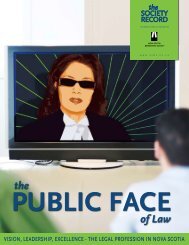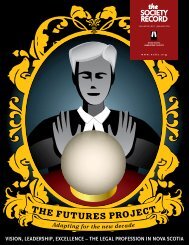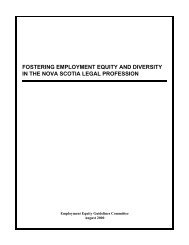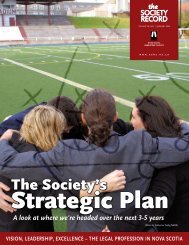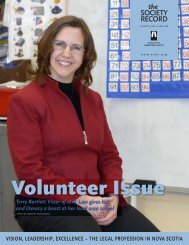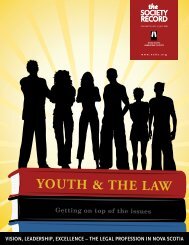SR Vol 27 No 4, October 2009 - Nova Scotia Barristers' Society
SR Vol 27 No 4, October 2009 - Nova Scotia Barristers' Society
SR Vol 27 No 4, October 2009 - Nova Scotia Barristers' Society
- No tags were found...
Create successful ePaper yourself
Turn your PDF publications into a flip-book with our unique Google optimized e-Paper software.
I recounted this episode recently to a longtime Sydney resident, adistinguished and fair-minded community leader who lived throughthe murder, Marshall’s trial, his subsequent release and the RoyalCommission. Partway through the story, he cut me off.“Parker, are you absolutely certain Marshall had nothing to do withthe murder?”I was thunderstruck.“___________,” I said. “They found the knife that killed Seale inEbsary’s basement. It still had fibers from Seale’s jacket on it. There isno doubt whatsoever that Ebsary killed Sandy Seale.”“Oh,” said my friend, looking sheepish. “I’m relieved to hear that.”A few weeks after Marshall’s death, I was working for a client whoseproject team included a bright university student on a summerwork program. She introduced herself as a Cape Bretoner, and a fewquestions about her family revealed a connection to Marshall, bymarriage. She appeared embarrassed at the revelation.“My family doesn’t talk much about that connection,” she said softly.I asked if she knew anything about the Marshall case.“<strong>No</strong>t really,” she said.I quickly rattled off a bare outline of the facts: That Marshall wasa shy, inarticulate teenager, completely innocent of any crime. Thatpolice bullied child witnesses into lying on the stand. That when theRCMP reinvestigated more than a decade later, the case fell apartin days. That when the Mounties reinterviewed the untruthfulwitnesses, they were eager to give up the guilty secret they had carriedfor so long. That one of the most thorough Royal Commissions inCanadian history concluded that the justice system failed Marshall“at every turn,” and that this failure was attributable, “at least inpart,” to racism.The young intern was astonished.“I had no idea,” she said. “I just assumed from what I had heard thathe was some kind of terrible person.”Throughout his adult life, Donald Marshall faced white people whojust naturally assumed he was “some kind of terrible person.” Againand again I have heard people who never laid eyes on Donald assertwith absolute confidence that he was “a punk,” “a troublemaker,” that“he was up to no good that night,” that “he deserved what he got,”and that, in the unforgivable words of the disgraced Court of Appealpanel, “any injustice ... was more apparent than real.”In a companion piece in this journal, lawyer Bruce Wildsmith asks why“so many people otherwise considered competent demonstrate[d] alack of competence in this case?” The commission had an answer: “[T]he conclusion [is] inescapable that Donald Marshall, Jr. was convictedand sent to prison, in part at least, because he was a Native person.”I have a similar question. After a searching inquiry by three justicesof national repute, assisted by lawyers of unimpeachable caliber, haslaid bare all the facts, why do so many <strong>No</strong>va <strong>Scotia</strong>ns keep wantingto find fault with the boy who suffered this injustice?Why does a well-informed community leader, widely respected forhis fairness, wonder if it was really Marshall who committed the murder?Why does a bright young university student feel ashamed of herfamily’s connection to this man? Why does a capable reporter for theNew York Times find it so easy to believe that Marshall and Seale, anIndian and an African <strong>No</strong>va <strong>Scotia</strong>n, were trying to rob Roy Ebsarywhen he stabbed them both, killing Seale?In <strong>2009</strong>, our world has progressed to the point that virtually everyoneagrees it is abhorrent to judge anyone on their race. Overt racismis widely regarded as shameful. As the Marshall commission put it,“That racism played a role in Marshall’s conviction and imprisonmentis one of the most difficult and disturbing findings this RoyalCommission has made.”To white people, this feels like progress, and no doubt it is. The dayswhen my friend’s kindly Sydney Mines grandmother would throwout the dishes on which she served tea and biscuits to a Mi’kmawpeddler are well behind us.Yet, ironically, the very stigma we attach to racism makes it that muchharder for us to confront the remnants of racial prejudice lurkingwithin us.Mi’kmaq do not regard Donald Marshall as “some kind of terribleperson.” They hold him in high esteem, notwithstanding thepersonal struggles he endured following his release from prison. Theyunderstand, instinctively, what he went through, and the role thatracism played. They know how much of the progress Mi’kmaq havemade since 1971 rests on his shoulders. They recognize the grace withwhich he bore that burden, and the toll it took.This is the ultimate paradox of the Marshall case: We seek to blamethe 17-year-old Donald Marshall for his wrongful conviction, andwe take thinly disguised satisfaction at the troubles he experiencedin later life, because, otherwise, we would have to acknowledge thatour culture is steeped in racism—and racism is a terrible thing. So weseek to shift the blame, “at least in part,” to young Donald and hisadult incarnation.Racism is a terrible thing. The Royal Commission on the DonaldMarshall, Jr., Prosecution did us a great service by recognizing therole it played. It remains for us to face the role it still plays, and inthat, <strong>No</strong>va <strong>Scotia</strong> has a ways to go.Parker Donham wrote a two-part book section on the Marshall casefor the <strong>October</strong> and <strong>No</strong>vember 1988 editions of Reader’s Digest. Hefrequently wrote about the case, and the <strong>No</strong>va <strong>Scotia</strong> government’sresponse, in his Halifax Daily News columns. A 1984 lawsuit againstDonham and the CBC for remarks he made on the radio programSunday Morning, criticizing the police chief of Sydney, muted mostpress commentary about the case for two years. The lawsuit wasabandoned on the eve of trial, unleashing a torrent of press commentcritical of government inaction and leading to the establishment ofthe Marshall Commission. Donham now works as a communicationsconsultant with the Kempt Head Institute, and maintains a blog atcontrarian.ca.42 The <strong>Society</strong> Record



